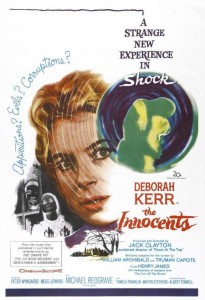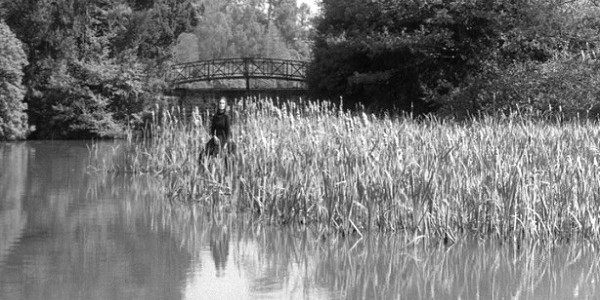Ghost stories and creepy houses are staples of the gothic horror subgenre. They’re tropes that lovers of the gothic never seem to tire of, me included. There’s just something liminal about looming gargantuan old houses, they could hide any number of secrets and spirits. These houses have inspired many creatives, readers, and audiences, and one of the most memorable among them—aside from Shirley Jackson’s Hill House—is Henry James’s Bly Manor. If you are even tangentially interested in the gothic odds are you are already acquainted with Bly Manor. If you aren’t, well, you will be. The Turn of the Screw has been adapted and reimagined many times over the years, but one film adaptation stands apart from the rest and that’s THE INNOCENTS (1961) directed by Jack Clayton. It is perhaps one of the most masterfully faithful and interesting adaptations of the iconic short story. It makes for a good watch with the 2020 modern reimagination THE HAUNTING OF BLY MANOR, which duly pays homage to THE INNOCENTS in many ways.
If you’ve read The Turn of the Screw, you are well-versed in the plotline of the young governess whose charges are two orphaned children housed in an English manor that may or may not be haunted. THE INNOCENTS follows that story arc and manages to make a film adaptation that rivals its source material in deft and depth. The ever lovely Deborah Kerr stars as Miss Giddens—Clayton’s take on James’s unnamed governess protagonist at the center of the story. Miss Giddens takes on the role of Miles (Martin Stephens) and Flora’s (Pamela Franklin) caretaker after the tragic death of their previous governess. As she settles in at Bly, Miss Giddens gets to know the children better and becomes increasingly perturbed by Miles and his behavior. To make matters even more dire and unhinged, Miss Giddens starts to see apparitions of the former governess Miss Jessel and her lover Peter Quint. Quint also worked at Bly and was close with Miles. Miss Hidden is convinced she must protect the children from these specters, fearing that they are using the children’s bodies as vessels to continue their torrid love affair.
If you like the tropes of creepy children and sanity slippage, THE INNOCENTS is one of the foremothers of those very tropes. Miss Giddens and her terror are palpable through the film and help drive the plot to a stunningly breathless conclusion. It’s great acting and film making and a lesson in how to create terror and scares without any gore or grossness. Not that I have anything against that, but there is a time and place for all kinds of horror and THE INNOCENTS dwells in the realm of psychological distress. The story is unsettling and arresting and builds on an innately cunning sense of unease that is found in The Turn of the Screw. Typically, I am someone who prefers the book or short story to the adaptation, but THE INNOCENTS takes an already terrifying premise and spins it into something nearly perfect.

THE INNOCENTS is achingly stylish in a way that few film productions are today. There is a lavish air about it that is usually only found within these older black and white gothic horror films. It’s like the melding of a most beautiful theatre production with all the trappings of a great art department to help give the film its haunted feel. Not only does the film serve as a heady horror, it’s a worthy adaptation of its source material. Most of the themes present in James’s masterwork are found in the adaptation, and Clayton lovingly brings the nightmare to life, proving that older films are hardly inaccessible relics of the past.
Perhaps, one of the most provocative aspects of THE INNOCENTS in the modern day is that it is a prime example that older doesn’t necessarily mean bad or outdated. Film discourse can be irritatingly inane, and there is none more inane than the idea that older films are somehow obsolete and are all rife with archaic ideals and thus are all inherently harmful, but again, that idea is inane and incorrect. Even unsavory films serve a larger purpose, documenting cultural trends regarding horrific systemic institutions and practices like racism and misogyny. THE INNOCENTS is one great film that would get lost among the shuffle of this oddly disdainful idea of shunning older films altogether. In fact, a lot of gothic horror films that are essential to understanding the genre in its film format would be tossed aside and discarded like trash.
THE INNOCENTS is one of the better known entries into the larger gothic horror canon, but it’s an important one that deserves routine revisiting. It’s one that isn’t talked about enough for my taste, but then again, I don’t think gothic horror is discussed as much as it should be. Considering this take on The Turn of the Screw has inspired many filmmakers and writers since release, I’m hoping that it will inspire more, and that appreciating earlier examples of gothic media will help usher in some greater gothic renaissance we’re long overdue for one.


No Comments